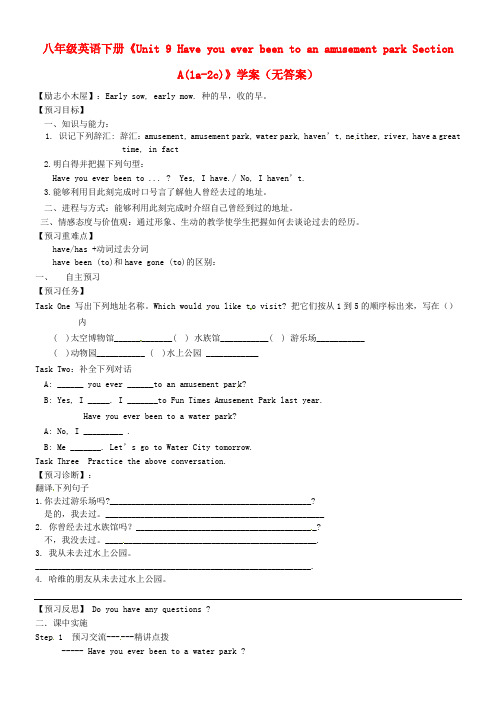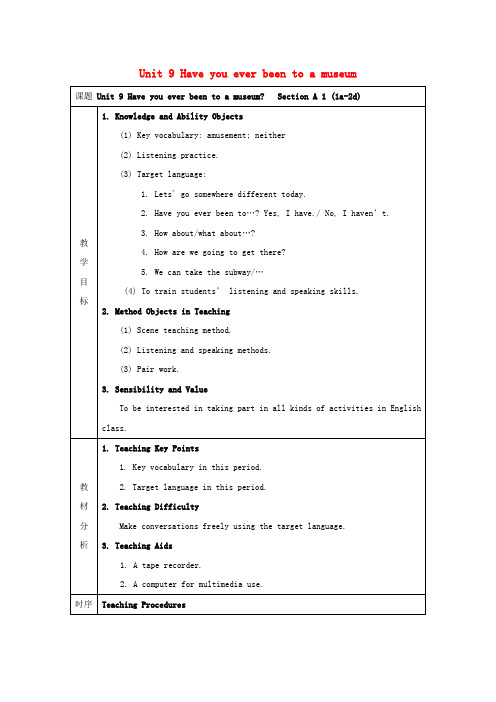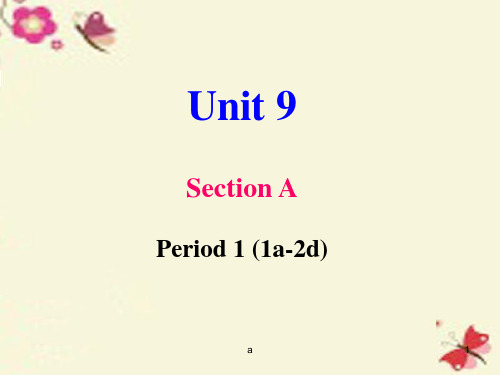2017-2018学年度第二学期八年级英语下册Unit 9 Have you ever been t
八年级英语下册Unit9HaveyoueverbeentoanamusementparkSectio

八年级英语下册《Unit 9 Have you ever been to an amusement park SectionA(1a-2c)》学案(无答案)【励志小木屋】:Early sow, early mow. 种的早,收的早。
【预习目标】一、知识与能力:1. 识记下列辞汇: 辞汇:amusement, amusement park, water park, haven’t, ne ither, river, have a greattime, in fact2.明白得并把握下列句型:Have you ever been to ... ? Yes, I have./ No, I haven’t.3.能够利用目此刻完成时口号言了解他人曾经去过的地址。
二、进程与方式:能够利用此刻完成时介绍自己曾经到过的地址。
三、情感态度与价值观:通过形象、生动的教学使学生把握如何去谈论过去的经历。
【预习重难点】have/has +动词过去分词have been (to)和have gone (to)的区别:一、自主预习【预习任务】Task One 写出下列地址名称。
Which would you like t o visit? 把它们按从1到5的顺序标出来,写在()内( )太空博物馆_____________( ) 水族馆___________( ) 游乐场___________( )动物园___________ ( )水上公园 ____________Task Two:补全下列对话A: ______ you ever ______to an amusement par k?B: Yes, I _____. I _______to Fun Times Amusement Park last year.Have you ever been to a water park?A: No, I _________ .B: Me _______. Let’s go to Water City tomorrow.Task Three Practice the above conversation.【预习诊断】:翻译下列句子1.你去过游乐场吗?______________________________________________?是的,我去过。
新版人教新目标版2018学年八年级英语下册Unit9Haveyoueverbeentoamuseum教案

C. Mother and kid. Answer: CCA 2. Listen again. Listen and check the boxes. Have these students ever been to these places? Science museum History museum Art museum Nature museum Space museum
2)When did Claudia visit the nature museum?
A. last year
B. last summer C. Last school trip
3)What may the relationship be between the two speakers? A. Friends B. Teacபைடு நூலகம்er and student
Get students to work in pairs to practice the conversation: “ Have you ever been to…” “Yes, I have”/ Not, I haven’t. Step 3 Pre-listening 1. Section A 1a T: OK. Now open your books on Page 65. In Part 1a, 6 places are given. Please read the names of these places. (Teacher writes the names on the blackboard.) Which of these places would you like to visit? Rank them from 1 to 5. S 4: Amusement park ______, water park ______, zoo ______ aquarium ______ space museum ______. S 5: Space museum ______, aquarium ______, zoo ______, water park ______, amusement park ______ S6: … 2. Talk about the picture Step 4 Listening 1. Listen and choose the best answer. The first and the second question aim to listening to time, and the third one aims to listen for the relationship. This activity trains students’ listening ability for listening for specific relationship. 1)When did Sarah visit the National Science Museum? A. Today B. Yesterday C. Last year
英语人教版八年级下册Unit 9 Have you ever been to

Go for it! 八(下)Unit 9 Have you ever been toan amusement park?Period 1【教案背景】以“英语新课程标准”为宗旨,适应新课程改革的需要,面向全体学生,提高学生的人文素养,增强实践能力和创新精神。
正确把握英语学科特点,积极倡导合作探究的学习方式。
培养学生积极地情感态度和正确的人生价值观,提高学生综合素质,为学生全面发展和终身发展奠定基础。
采用师生互动,倡导学生亲自体验参与,即采用任务型的教学模式,让学生在老师的指导下通过感知、体验、实践、参与和合作等方式,实现完成学习任务的目标,感受学习过程的成功;注重学生学习过程评价,促进学生发展,建立能激励学生学习兴趣和自主学习能力发展的评价体系。
【教学课题】新目标八下Unit 9 SectionA:1a,1b,1c【教材分析】本单元以谈论过去的经历为话题,主要学习现在完成时的用法。
通过丰富多彩的语言情景实践对Have/Has… ever been to…? 的句型进行充分的操练,作为第一课时要让学生正确运用Have you ever been to…?的句型及相关回答Yes, I have./No, I haven’t.本课时教材中提供的所有活动都以现在完成时态为中心,通过一系列的听、说、读、写的训练,来加深学生对现在完成时态的理解,明白英汉两种语言在结构及表达方法的一些异同点。
从而提高他们运用所学语言的综合能力。
学生已经在在Go for it! 8下U-8过现在完成进行时态,因而对现在完成时态并不陌生。
通过对学生们喜闻乐见的一些娱乐场所(fun places)的描述,反复运用句型Have you ever been to…? I’ve never been to…. 来激发他们使用本单元所学单词的兴趣。
【教学方法】1、师生互动、生生互动教学法;2、图片采用PPT课件展示;3、课文录音采用MP3音频播放;4、作业采用学生人手一份纸质作业和大屏幕课件展示答案的方法;5、学生课堂活动评价采用个人得小礼品竞赛的方法。
2018年春八年级英语下册Unit9HaveyoueverbeentoamuseumSectionA(1a_2c)导学课件(新版)人教新目标版

二、补全对话。
A: Have you everbeen to an amusement park?
B: Yes, I hav. eI
wtoentthe City Amusement Park last
week. It was really fantastic.
Have you everbeen to a science museum?
ever seen. 3. —Have you everbeen to Hainan before? —No,
never . 在现在完成时结构中,ever表示 曾经 ,多用于疑问句;never意 为 从来没有,是一个 否定副词,构成否定句。
用现在完成时谈论曾经去过的地方 —Have you ever been to...? —Yes, I have. I’ve been to... —No, I haven’t. I’ve never beenevebreen to a science museum.
B: Me, neither. Let’s go to one this weekend. A: OK. How are we goingthere?
B: We can take the No. 6 bus.
用ever 和never填空 1. I’ve neverseen such a good film before. 2. This is really the best film that I’ve
★探究二 完成1b的听力训练题。 听前:看表格,了解对话中将会出现哪些不同的博物馆。猜测 Claudia和Sarah分别去过哪些博物馆? 听后:两人一组,检查核对答案。
★探究三 1. 完成2a、 2b的听力训练题。 听前:(1) 仔细观察2a中的地图。图中有哪些不同的地点?想一想 到达这些地点可以乘什么交通工具? (2) 浏览2b表格中的句子。从这些句子你能预测到哪些是与你要 听的内容有关的信息? 听后:两人一组核对答案,分析错误原因,交流经验和体会。
八年级英语下册 Unit 9 Have you ever been to a museum Sect

a
32
3b Read the article again and
answer the following questions.
1.What does Ken say about the American Computer Museum? 2. What can we learn at the International Museum of Toilets? 3. Why is the Hangzhou National Tea Museum a nice place to enjoy tea?
a
42
Do you know these countries?
a
43
the United Kingdom
a
44
a
45
a
46
Mexico
a
47
India
a
48
Japan
a
49
Singapore
a
50
What do you know about Singapore? Say something about it.
a
21
Conversation 2
1. Linda has been to the amusement F
park.
2. Linda went to the amusement
T
park yesterday.
3. Linda is going to the amusement F park again by bike.
初中英语八年级下册《Unit 9 Have you ever been to an amusemen

(2) A: Would you like to have some ice cream instead of that cake?
B: I hate ice cream! I want a cake instead.
get my skates
Pre-read
Have you ever been to Holland? What do you know about Holland?
( F ) Linda has been to the aquarium.
( T ) Linda went to the zoo three times last
yeFar.
(
) Linda is going to the zoo again next
weFek.
CoTnversation 3
( T ) Harvey had a great time at Water World.
√
A: Have you ever been to the water park? B: No, I haven’t. A: Me, neither. B: How will we get there? A: I don’t know. Let’s ask Sam. He has been to
there Twice. B: OK, let’s go and ask him.
Language Points
neither (1) Neither Jenny nor I own a car. (2) Leon neither drinks nor smokes. (3) My husband doesn’t want to see a movie tonight, and neither do I. (4) A: Which of the dresses did you like? B: Neither of them. (5) A: I haven’t seen that movie. B: I haven’t ,either. ( Neither have I. ) ( Me, neither )
- 1、下载文档前请自行甄别文档内容的完整性,平台不提供额外的编辑、内容补充、找答案等附加服务。
- 2、"仅部分预览"的文档,不可在线预览部分如存在完整性等问题,可反馈申请退款(可完整预览的文档不适用该条件!)。
- 3、如文档侵犯您的权益,请联系客服反馈,我们会尽快为您处理(人工客服工作时间:9:00-18:30)。
一.词汇练习。
1.believe v.相信→adj.可信的adj.难以置信的;不真实的2.rapid adj.迅速的;快速的→adv.迅速地ual adj.通常的→adv.通常地adj.特别的;不寻常的4.encourage v.鼓励→n.5.society n.社会→adj.社会的6.peace n.和平→adj.和平的;安宁的7.it pron.它→(宾格)(形容词性物主代词/名词性物主代词)(反身代词)8.collect v.收集;采集→n.9.safe adj. 简单的→ (复数)10.simple adj.简单的→adv.仅仅;只11.India n.印度→adj.印度的12.fox n.狐狸→(复数)13.most adj.大多数的→adv.主要地;通常14.memory n.记忆;回忆→(复数)15.scarf n.围巾;披巾;头巾→(复数)16.soft adj.软的;柔软的→adv.柔软地17.own v.拥有;有→n.物主;主人18.certain adj.某种;某事;某人→adv.当然19.honest adj.诚实的;老实的→(反义词)n.诚实;正直20.truth n.真理→adj.诚实的;真实的21.especial adj.特别的,特殊的→adv.尤其;特别;格外22.consider v.注视;仔细考虑→(过去式/过去分词)n.考虑23.hold v.拥有,抓住→(过去式/过去分词)25.游乐场26.茶艺27.茶具33.全年30.两个;一对;几个31.数以千计的;许许多多的32.一方面……另一方面……二.课堂重点剖析。
1.You should consider people before you act. 在行动之前你应该先考虑别人。
consider的用法:◆consider 用作及物动词,意为“考虑”。
后接名词、动词的形式、宾语从句或“疑问词+动词不定式”。
如:We must consider what to do next.我们必须考虑接下来要做什么。
◆consider用作不及物动词,常用于“consider sb./sth. (as)+名词”结构或“consider sb./sth. (+to be)+形容词”结构中。
如:At first,they considered me as a doctor.起初,他们认为我是一名医生。
We consider this matter to be very important.我们认为这件事很重要。
①I'm considering (go) abroad some day.②我们现在不要打扰他,他正在考虑接下来做什么。
Let's not bother him at the moment. He is considering____________next. ____________ _______________ _______________.③为什么不考虑游览北京呢?那里有如此多名胜古迹。
Why not visiting Beijing? There are so many places of interest there.2.Have you ever been to a museum? 你曾经去过博物馆吗?辨析have been to, have gone to与have been in⑴have been to意为“曾经去过某地”(现在已经回来了),常与表示次数的副词连用。
I have been to Beijing three times. 我去过北京三次。
⑵have gone to意为“去了某地”,表示说话时某人已经不在现场,可能在去的途中,也可能已经到达目的地。
Tom isn’t here. He has gone to the bookshop. 汤姆不在这儿。
他到书店去了。
⑶have been in意为“待在某地”,表示状态,后面常接表示“时间段”的状语。
Mr. Brown has been in Shanghai for three days. 布朗先生来上海三天了。
①她去图书馆了,你可以在那里找到她。
She the library. You can find her there.②我正在期待我女儿给我打电话,她已经去纽约三年了。
I'm expecting a call from my daughter. She in New York for three years.③—Where is Mr. Zhang?—He together with his students the Summer Palace.A. has gone toB. have gone toC. has been toD. have been to④I Hong Kong twice with my parents. We have many beautiful memories there.A. have gone toB. have been inC. have been toD. has gone to3.We have decided to each sell five things that we no longer use. 我们已经决定每个人卖五件我们不再用的东西。
辨析no longer, not...any longer, no more与not...any more⑴no longer=not…any longer不再……表示持续了一段时间的动作,状态已“不再延续”,常与延续性动词连用。
常用于过去时、现在时或将来时的句子中。
They can't stay here any longer. 他们不能再留在这里了。
⑵no more=not…any more不再……指某一反复发生的动作已“不再重复”,指重复次数方面,还可指程度上或数量上不再重复,常与非延续性动词连用。
也可表示数量或程度,位于名词之前,此时more为形容词。
You can drink no more. =You can’t drink any more. 你不能再喝了。
①冰箱里没有面包了。
只剩下一瓶橙汁了。
There is bread in the fridge. Only a bottle of orange juice is left.②她现在不再去乡下了,但她过去每周去那儿。
She doesn't go to the countryside now, but she used to go there every week.4.Among these is Zhong Wei, a 46-year-old husband and father. 在这些人中间,钟伟是一位46岁的丈夫和父亲。
辨析among与between①among用于三者或三者以上,后接一个不确定数目的复数名词或复数宾格代词There was someone shouting at me among the students.学生中间有人在喊我。
②between用于两者之间,后接一个有具体数目的人或物,或是由and连接的两个具体的人或物I will come between twelve and one o'clock.我将在十二点至一点钟之间过来。
①城市和城镇之间将会有一条新路吗?Is there going to be a new road the city and the town?②他在苹果中发现了一个梨。
He found a pear the apples.③thousands of people, you will meet those you want to make friends with.A. BetweenB. ByC. ToD. Among④The doctor told us to eat more fruit two meals. So my brother bought me many apples.A. amongB. betweenC. inD. since⑤It is easy to find my brother the students because he is the tallest.A. betweenB. amongC. inD. with⑥Lily is my classmate. We _______ each other since she came to our school.A. knowB. knewC. have knownD. will know⑦—What an interesting story she told us!—Yes, and her voice sounded _______.A. sweetB. smallC. clearlyD. sadly⑧—I don't know where to go this summer vacation.—Why not _ _ visiting Jingzhou? There are many places of interest.A. regardB. considerC. wonderD. suggest⑨There are many beautiful places to visit in Anhui, _______ Mount Huang in autumn.A. simplyB. finallyC. luckilyD. especially⑩To the teacher's joy, the student made great _______ this term.A. resultB. preparationC. suggestionD. progress5.Let's go today. 今天我们去个不一样的地方。
6.It's best to visit Singapore . 秋季是去新加坡旅游的最佳季节。
7.One great thing about Singapore is that the temperature is almost the same .新加坡最吸引人的地方是一年里温度基本是一样的8.It seem strange to go to a zoo when it's dark. 天黑才去动物园可能看起来奇怪。
9.We a tent and cooked outside. 我们搭起了帐篷,在外面野餐。
